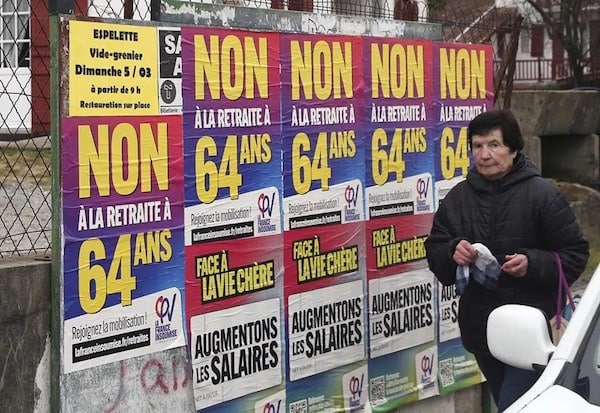One day before a countrywide strike across France is set to begin, media reported that French truckers were obstructing major roadways in protest against the wildly unpopular pension reform.
Haulers would deploy along main logistics and in major cities, according to Jose Zydower, head of transport and logistics of the Force Ouvriere-UNCP union.
The March 7 strike, according to state-owned railroad operator SNCF, will affect rail service nationally long into Wednesday. Train services will be slashed on several routes.
In opposition to President Emmanuel Macron’s proposal to raise the retirement age from 62 to 64 and require French citizens to work longer to qualify for a full pension, trade unions that represent the interests of employees from a number of public sectors called for walkouts on Tuesday.
Despite trade unions threatening to bring the nation to a standstill, an Elabe survey by BFMTV reported Monday that roughly 60% of French people support industrial action against the law, which is presently being debated in the upper house of parliament.
2.5mln protest Macron pension reform plan, ‘standstill’ looming
Hundreds of thousands of people took to the streets in France weeks ago in a fourth day of action against French President Emmanuel Macron’s pension reform, with unions warning they would ramp up strikes if the plan is not dropped.
Macron and his government face a double battle to raise the pension agefrom 62 to 64, overcoming resistance on the streets as well as pushing the legislation through parliament.
The CGT union said 500,000 people protested in Paris alone, and over 2.5 million nationwide.
The French Ministry of Interior, which generally gives much lower numbers, claimed there were 963,000 protesters nationwide and 93,000 in Paris.
Other French cities also witnessed protests, with images on television showing police using water cannons in the western city of Rennes.
National strike that would ‘bring France to a standstill’
The march was led by the leaders of France’s eight main unions. The unions warned in a joint statement that they would call for a national strike that would “bring France to a standstill” on March 7 — when the text of the bill is due in France’s upper house — if the government “remained deaf to the popular mobilization.”
The leader of the hardline CGT, Philippe Martinez, pointed out that “the ball is in the court of the president and the government to determine if the movement intensifies and hardens or if they take into account the current mobilization.”
Laurent Berger, the head of the CFDT union, a more moderate group the government hoped would take a different line, considered that the timetable would give time to the government if it wants to react.
In the same context, unions representing workers on the Paris RATP public transport system called for a rolling strike from March 7.

